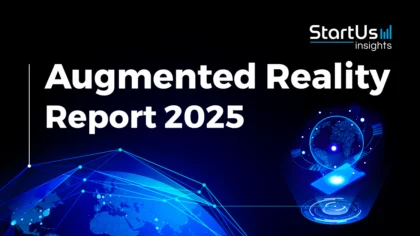Accelerate Productivity in 2025
Reignite Growth Despite the Global Slowdown
Advances in industrial automation drive production efficiency, reduce costs, and optimize processes, making it a critical focus for manufacturers. Startups accelerate this shift by offering off-the-shelf, easily integrable, and scalable automation solutions.
This research provides an overview of the top 10 industrial automation trends in 2025, covering artificial intelligence (AI), advanced robotics, blockchain, and wearables.
These technologies enhance operational capabilities, streamline workflows, and enable more responsive and adaptive manufacturing environments, addressing the current market’s demand for greater efficiency and innovation. Read more to explore how they impact your business.
Top 10 Industrial Automation Trends
- Artificial Intelligence
- Advanced Robotics
- Industrial Internet of Things
- Edge & Cloud Computing
- Immersive Technologies
- Additive Manufacturing
- Cybersecurity
- 5G
- Blockchain
- Wearables
Methodology: How We Created the Industrial Automation Trend Report
For our trend reports, we leverage our proprietary StartUs Insights Discovery Platform, covering 5M+ global startups, 20K technologies & trends plus 150M+ patents, news articles, and market reports.
Creating a report involves approximately 40 hours of analysis. We evaluate our own startup data and complement these insights with external research, including industry reports, news articles, and market analyses. This process enables us to identify the most impactful and innovative trends in the industrial automation industry.
For each trend, we select two exemplary startups that meet the following criteria:
- Relevance: Their product, technology, or solution aligns with the trend.
- Founding Year: Established between 2020 and 2025.
- Company Size: A maximum of 100 employees.
- Location: Specific geographic considerations.
This approach ensures our reports provide reliable, actionable insights into the industrial automation innovation ecosystem while highlighting startups driving technological advancements in the industry.
Innovation Map outlines the Top 10 Industrial Automation Trends & 20 Promising Startups
For this in-depth research on the Top Industrial Automation Trends & Startups, we analyzed a sample of 2940+ global startups & scaleups. The Industrial Automation Innovation Map created from this data-driven research helps you improve strategic decision-making by giving you a comprehensive overview of the industrial automation trends & startups that impact your company.
Tree Map reveals the Impact of the Top 10 Industrial Automation Trends
To prevent anomalies and optimize production, startups develop AI-based solutions. Robotics and additive manufacturing also automate tasks, mitigating human intervention. To improve connectivity between devices and machines, manufacturers leverage industrial internet of things (IIoT), edge & cloud computing, and 5G. Further, immersive technologies and wearables improve worker efficiency by providing additional visualization and improving safety. As the security of industrial automation processes is crucial, cybersecurity and blockchain are preventing cyber attacks.
Global Startup Heat Map covers 2 947 Industrial Automation Startups & Scaleups
The Global Startup Heat Map showcases the distribution of 2940+ exemplary startups and scale-ups analyzed using the StartUs Insights Discovery Platform. It highlights high startup activity in the United States, followed by India and Europe. From these, 20 promising startups are featured below, selected based on factors like founding year, location, and funding.
Want to Explore Industrial Automation Innovations & Trends?
Top 10 Emerging Industrial Automation Trends [2025]
1. Artificial Intelligence
AI enables machines to learn, adapt, and make decisions on their own. Manufacturers utilize it to identify asset patterns and anomalies for optimizing production and reducing downtime.
Implementation of AI in industrial robots and drones improves their precision and assists tasks such as inspection, maintenance, and material handling. This reduces the need for human intervention and lowers the risk of accidents.
As a result, AI improves the efficiency of maintenance operations and prolongs equipment life. For developing such solutions, startups utilize machine learning (ML), deep learning, and computer vision.
According to a survey, 40% of manufacturers are set to invest in AI and machine learning to make industrial processes more efficient.
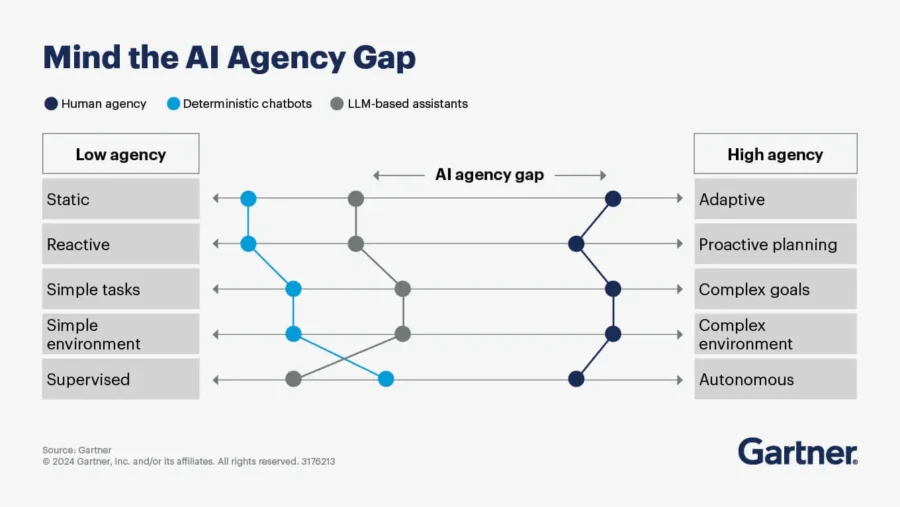
Credit: Gartner
According to Gartner, 33% of enterprise software applications will include agentic AI by 2028, up from less than 1% in 2024. This will enable 15% of day-to-day work decisions to be made autonomously.
DAIM Research makes an AI-based Material Handling System
South Korean startup DAIM Research develops an automated material handling system. It uses collaborative intelligence to manage logistics robot fleets. The system maximizes the efficiency of material control systems by distributing delivery orders to logistics robots.
Moreover, it continues to operate even with rapid changes in logistics patterns. This allows factories to automate material handling and vehicle management, increasing traffic volume and reducing transport time.
Inovako develops AI-powered Industrial Vision
Spanish startup Inovako maximizes productivity and quality on the shopfloor with a no-code AI-powered industrial vision. It improves inspection quality by measuring the defects on high-gloss surfaces. In addition, the startup’s solution features cycle training to track machines and operators as well as check related cycles.
2. Advanced Robotics
Robots support replaces workers in hazardous environments to minimize accidents and mitigate labor shortages. Collaborative robots or cobots work alongside humans and adapt to their surroundings. This allows them to perform a wide range of tasks such as assembly, packaging, and machine tending.
These robots increase production line efficiency and decrease labor costs. Startups also work on other robots like mobile robots that navigate unstructured environments and robotic arms that improve dexterity and precision. Consequently, such end-of-arm tool (EOAT) streamlines welding, picking, placing, and 3D printing workflows. Additionally, self-healing robots reduce the need for maintenance.
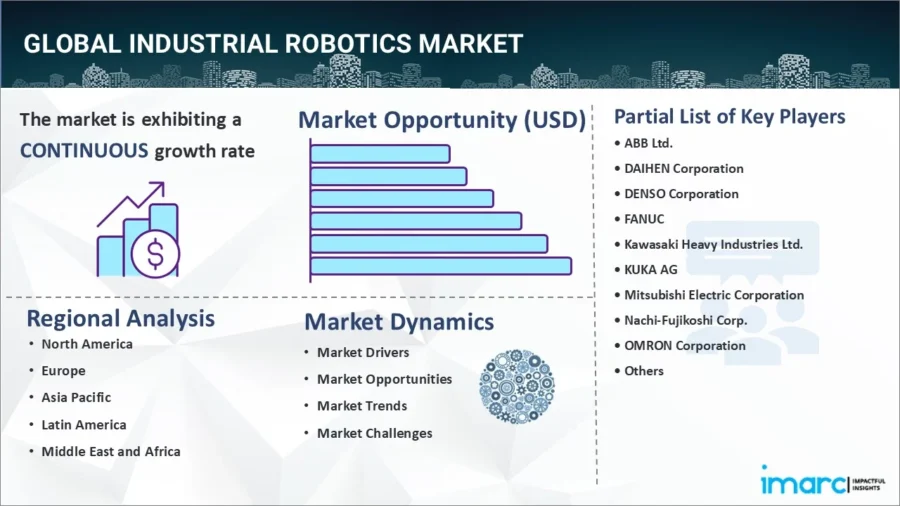
Credit: imarc
In 2024, there were more than 2.5 million industrial robots functional in various automation operations. Additionally, the global industrial robotics market is set to reach USD 52.7 billion in 2033, increasing at a compound annual growth rate (CAGR) of 11.47%.
Isochronic offers Pick-and-Place Robots
Swiss startup Isochronic provides industrial robotics for pick-and-place applications. It uses a patented industrial robotic system that features simultaneous part-transfer operations.
The system supports a long transfer distance while ensuring a high throughput. This optimizes space utilization and automates high-volume industrial processes such as packaging, recycling, filling, sealing, and precision assembly.
Botshare delivers Autonomous Mobile Robots (AMR)
Polish startup Botshare empowers manufacturing with AI-based AMR robotics. The startup’s AMR production technology speeds up robotics production, implementation, and product development. Using this technology, manufacturers are able to automate material handling workflows while accelerating in-house product development.
3. Industrial Internet of Things
For industrial automation, all industrial devices and machines must be connected to collect and analyze data in real-time. IIoT enables this and allows industrial businesses to optimize production, reduce downtime, and improve safety.
Moreover, it allows production managers to monitor floor environments and conditions. Additionally, IIoT powers solutions that alert workers and operators on potential hazards and track worker location and health, enabling more efficient emergency response.
The industrial IoT is set to reach USD 2146 billion growing at a compound annual growth rate (CAGR) of 17.20%. More than 65% of the businesses are using IIoT strategies for cost optimization.
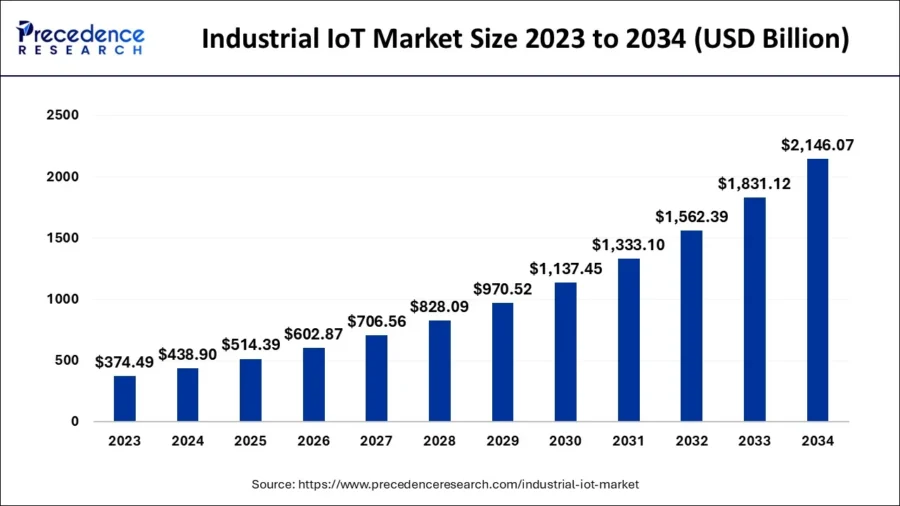
Source: Precedence Research
Startups are also working on edge IoT and artificial intelligence of things (AIoT) to move data processing closer to the source. This reduces network congestion and improves the responsiveness of industrial systems. IIoT thus enables real-time asset monitoring to identify potential issues and enable preventive maintenance.
VISUALYS offers an IIoT Platform
German startup VISUALYS develops Rilheva, an IIoT Platform for data collection, storage, and processing. It provides live and historical data, including alarms and charts.
The platform is highly customizable and adapts to industry needs. For instance, it features machine-to-machine (M2M) connectivity automation, asset location maps, and advanced file management.
Rilheva thus optimizes machine monitoring and provides real-time status of industrial systems and machines.
Akinê provides IIoT Well Controllers
Canadian startup Akinê makes IIoT controllers that monitor and operate artificial lifts. They work with injection wells, facilities, and pipelines as well as artificial lifts with or without variable frequency drive (VFD).
Moreover, the controllers include a wellhead camera to provide virtual site inspections (VSIs) augmented by AI to automatically identify leaking wellhead components. This allows oil producers to avoid spills, increase production, and reduce operational costs.
4. Edge & Cloud Computing
Edge computing is driven by the need for real-time data processing and low-latency communication in industrial settings. At the same time, cloud-based solutions reduce IT overhead and simplify remote data access for businesses. Factories thus integrate both edge and cloud computing for industrial automation.
For instance, edge computing performs real-time monitoring and machinery control while cloud computing powers data analytics, storage, and access. To aid this, startups offer devices and platforms that integrate into existing machinery to enable edge or cloud computing, mitigating in-house product development.
34% of manufacturers use edge for real-time analytics. Additionally, the global edge computing market is projected to grow by CAGR of 30.23% and reach USD 1531 billion by 2035.
DeepBrainz Technologies develops an AI Cloud Platform
Indian startup DeepBrainz Technologies creates an AI cloud platform for enterprises to build, deploy, and manage machine learning models at scale. Using it, manufacturers are able to quickly digitize supply chains and empower decision-making in logistics and warehousing operations.
Centralized data management also enables them to enable predictive maintenance and a smart factory ecosystem. These features allow manufacturers to mitigate in-house product development and accelerate AI integration.
NearbyComputing offers a Multi-access Edge Computing Platform
Spanish startup NearbyComputing provides NearbyOne, a multi-access edge computing platform. It covers the full lifecycle management of distributed systems, networks, and applications encompassing all layers, from the edge to the cloud.
The platform provides versatile multi-access edge computing tools and automates the provision, configuration, and installation of elements in the edge stack. This provides industrial businesses with cross-domain orchestration capabilities that are built for speed, performance, and availability. Consequently, it powers industrial, latency-sensitive, data-intensive, and mission-critical applications.
5. Immersive Technologies
Implementation of virtual reality (VR) and augmented reality (AR) improves employee efficiency and safety. For example, VR simulates real-life scenarios to aid workers in training, allowing them to train in safe and controlled environments. Moreover, immersive technologies support real-time information sharing to improve worker performance and reduce manual errors.
Startups are using immersive reality technologies to provide digital twins of factories and assets as well as develop AR software for assisted maintenance of industrial equipment. As a result, immersive technologies support process automation, improve worker safety, increase productivity, and reduce downtime.
It is estimated that 70% out of the top 200 manufacturers will use AR/VR for industrial operations by 2025. The global AR/VR in manufacturing market size is forecasted to reach around USD 100.01 billion by 2034, accelerating at a CAGR of 22.88% from 2025 to 2034.
jungle VR offers VR-assisted Design Assistance
jungle VR is a French startup that provides Immerspacem, VR-based design assistance software for factory 4.0. It allows users to import 3D models from CAD software and visualize them to detect design errors and enable collaborative design. The software also features intuitive usability and comprehensive anomaly detection tools.
jungle VR’s solution optimizes design accuracy, enhances client presentations, and improves project management by involving all stakeholders in the design phase, reducing costs and ensuring better project outcomes.
AUGMENTUS develops a 3D Scanning Platform
Singaporean startup AUGMENTUS offers a platform for rapid 3D scanning, robot path planning, and control. It enables fast programming of robotics motion without code.
In combination with 3D scanners, the platform creates a digital twin of the work cell and localizes the robot in a 3D environment. This reduces the cost of designing and programming industrial robots to increase productivity.

6. Additive Manufacturing
The need for complex part geometries, precision, and accuracy slows down production workflows and requires expensive machinery. On the other hand, additive manufacturing automates part production and reduces the lead time for product development and prototyping.
3D printing also enables manufacturers to create customized parts and products. It minimizes material wastage and lowers tooling costs. Startups are thus focusing on novel 3D printing technologies and materials to increase the speed and accuracy of the printing process.
The global additive manufacturing market size is predicted to increase from USD 25.92 billion in 2025 to USD 125.94 billion by 2034, expanding at a CAGR of 19.29% from 2025 to 2034.
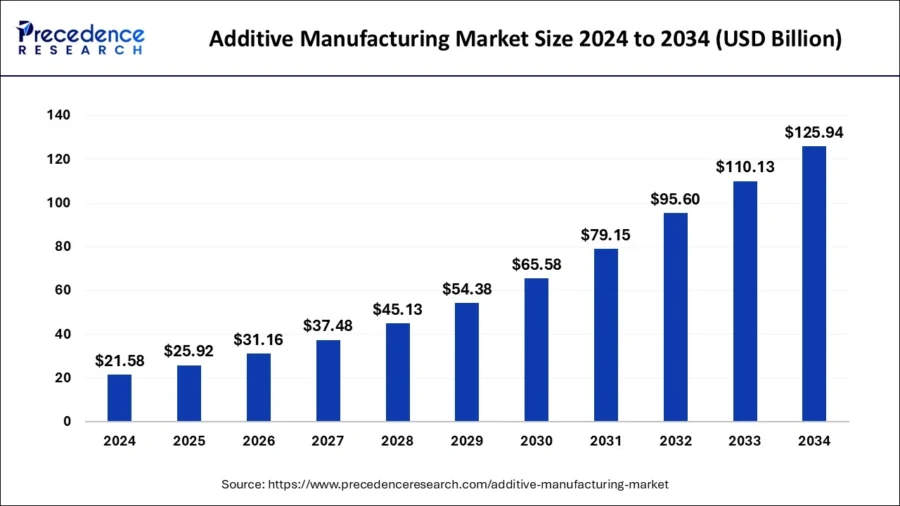
Credit: Precedence Research
AM-Flow simplifies 3D-part Recognition
Dutch startup AM-Flow provides AM-Vision, a machine that automates 3D-part recognition. It identifies unique 3D-printed parts and enables multiple sorting runs per day and ensures the right path routing. The startup’s solution allows manufacturers to prevent sorting mistakes, save space, and accelerate industrial automation.
Matta offers AI Copilots for Industrial 3D Printing
Matta is a UK-based startup that develops AI copilots for industrial 3D printing. The company’s AI copilots are trained on extensive 3D printing data to monitor and correct errors in real time. It optimizes parameters like flow rate and Z-offset to ensure precise prints as well as generates digital twins of printed parts for comprehensive quality control.
By leveraging these capabilities, Matta reduces manufacturing waste and improves efficiency.
7. Cybersecurity
Industrial digitization is necessary to automate production workflows, which in turn increases the risk of cyber attacks. This leads to downtimes, loss of sensitive data, and economic damage. To protect manufacturing processes, cybersecurity becomes essential for businesses. Such solutions prevent unauthorized access to industrial control systems (ICS).
Additionally, cybersecurity solutions prevent data breaches and protect intellectual property (IP), which is costly and damages reputation. Other solutions include AI-based cyber threat detection and end-to-end security solutions for IIoT systems. Startups further create security software solutions for operational technology (OT) devices that integrate into existing systems.
The industrial cybersecurity market is set to reach USD 36.24 billion by 2029, growing at a CAGR of 6.9%.

Credit: The Business Research Company
Additionally, zero-trust architecture and cloud-based security solutions are two of the emerging trends in industrial cybersecurity.
DeepInspect automates Threat Detection
DeepInspect is an Italian startup that develops a platform that streamlines threat detection and asset discovery to improve industrial cybersecurity. It identifies and monitors assets within OT environments to detect suspicious activities and potential risks in real time.
The platform integrates with third-party systems like SOC/SIEM and operates in air-gapped environments to ensure asset reliability and security.
First Watch develops an Industrial Cyber Security Platform
New Zealand-based startup First Watch creates an industrial cyber security platform that prevents attacks on OT networks. It protects human-machine interface (HMI) workstations and programmable logic controllers (PLC) by managing access control.
The platform also controls which applications are to be used to prevent unauthorized actions. This increases asset visibility, monitoring, and active protection capabilities.
8. 5G
Due to 5G’s faster data speeds, lower latency, and greater capacity, production floors integrate it to enable real-time communication and data processing. This is crucial for industrial automation as it enables a more reliable M2M connectivity. This improves the efficiency and productivity of production workflows.
Additionally, 5G supports remote monitoring and equipment control. Moreover, 5G facilitates the integration of data-intensive technologies, such as IIoT, AR, VR, and AI, for more efficient production systems. Therefore, startups make hardware and software to deploy 5G networks and 5G-powered devices in industrial environments.
The number of 5G IoT connections is predicted to grow at a CAGR of 59% from 2024 to 2030, reaching over 800 million connections.
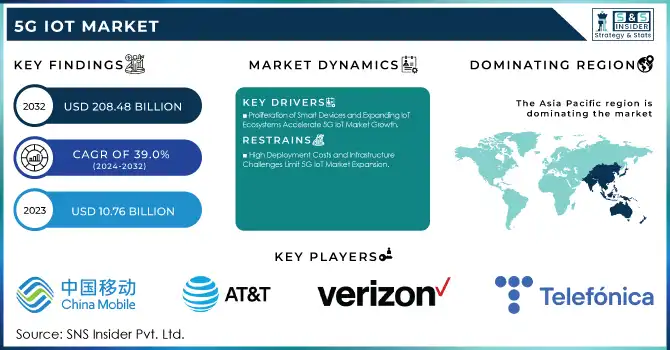
Credit: S&S Insider
Additionally, the 5G IoT market size was valued at USD 10.76 Billion in 2023 and is expected to reach USD 208.48 Billion by 2032 and grow at a CAGR of 39.0% over the forecast period 2024-2032.
Microamp Solutions provides 5G mmWave
Polish startup Microamp Solutions develops 5G mmWave networks. The startup enables mobile data services and new wireless broadband use cases such as remote object manipulation and industrial automation.

With the inherently limited range, mmWave suits for building private, stand-alone industrial networks. This also enables ultra-low latency and secures assets from malware and industrial espionage.
CampusGenius offers 5G-Core-as-a-Service (5GaaS)
German startup CampusGenius delivers 5GaaS to create a private and secure wireless network for industrial automation systems, such as robots and IIoT devices. The startup provides high-speed and low-latency wireless networks. They improve operational efficiency and reduce downtime for industrial automation systems.
9. Blockchain
Blockchain enables decentralized communication and secure data sharing between machines, people, and organizations. Moreover, startups offer smart contracts for supply chain management, decentralized equipment control, and monitoring, as well as tracking and authenticating products throughout the supply chain.
This enhances coordination and cooperation among stakeholders while automating data access and sharing. Blockchain thus creates a transparent, secure, and self-managing production ecosystem.
Tokenization is an emerging way of transaction in the manufacturing industry. Blockchain technology also provides immutable quality control and manufacturing procedures documentation.
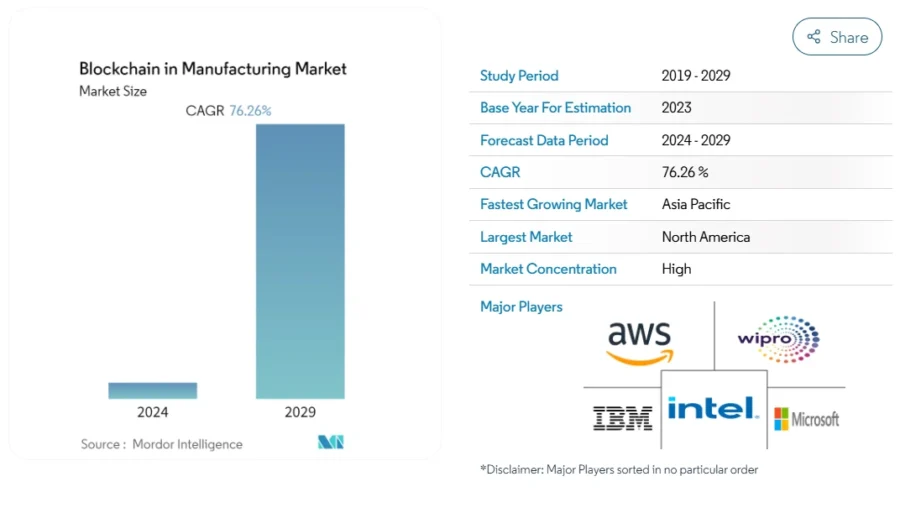
Credit: Mordor Intelligence
TrustCerts simplifies Digital Document Verification
German startup TrustCerts offers blockchain-based document verification. The startup’s solution creates a digital record of the document verifiable by employees or other stakeholders. Additionally, it verifies valid access permissions and protects sensitive areas. The startup thus enables industrial businesses to easily verify process quality, minimize errors, and protect evidence.
Infilock offers a Blockchain-based IIoT Platform
Infilock is a Canadian startup that develops a blockchain-powered industrial IoT platform. It securely monitors and controls industrial equipment using blockchain and smart contracts to ensure data integrity and protect against cyberattacks.
The platform also features real-time monitoring, predictive maintenance, and integration with external services via APIs. Infilock thus streamlines operations, reduces costs, and increases efficiency by safeguarding critical industrial infrastructure.
10. Wearables
Industrial wearables deliver real-time production information to workers and collect worker-specific data. Smart glasses and gloves enable them to access information and instructions directly in their field of view (FOV). This facilitates a hands-free workflow, allowing them to complete tasks more quickly and accurately.
The data collected from wearables also allows businesses to identify inefficiencies and optimize production processes. Startups are developing a variety of wearable devices for industrial automation. This includes exoskeletons that help workers in handling heavy objects and smart clothing that monitor their vital signs and work conditions.
The global industrial wearable devices market is set to reach USD 36.8 Billion by 2033, exhibiting a CAGR of 11.36% during 2025-2033.
Elonic provides a Hearable Device
US-based startup Elonic develops Kai, a smart wearable device that allows for hands-free, unobtrusive voice interactions. It uses bone conduction to provide two-way communication and real-time data access for workers in noisy environments. Moreover, the internet of things (IoT) integration allows production plant workers to perform inventory tracking and improve communication.
NIMMSTA makes an Industrial Smart Watch
German startup NIMMSTA offers an industrial smart watch for logistics process assistance. It enables free-hand scanning and features a touch display and interactive workflow guidance.
Moreover, the wearable is dust and water-resistant, making it suitable in warehouses, mining, and construction environments. This improves the industrial employees’ information access and allows real-time equipment and process control.
Discover all Industrial Automation Trends, Technologies & Startups
Developments in machine learning, robotics, 5G, edge computing, blockchain, and IIoT will remain to have a major impact on industrial automation. However, the cost of industrial automation is a limiting factor in its adoption. This prompts startups to develop cost-effective and off-the-shelf solutions to automate production workflows. Further, startups investigate novel technologies like quantum and neuromorphic computing, as well as develop self-managing production ecosystems.
The Industrial Automation Trends & Startups outlined in this report only scratch the surface of trends that we identified during our data-driven innovation & startup scouting process. Among others, smart contracts, IIoT, and robotics will transform the sector as we know it today. Identifying new opportunities & emerging technologies to implement into your business goes a long way in gaining a competitive advantage. Get in touch to easily & exhaustively scout startups, technologies & trends that matter to you!


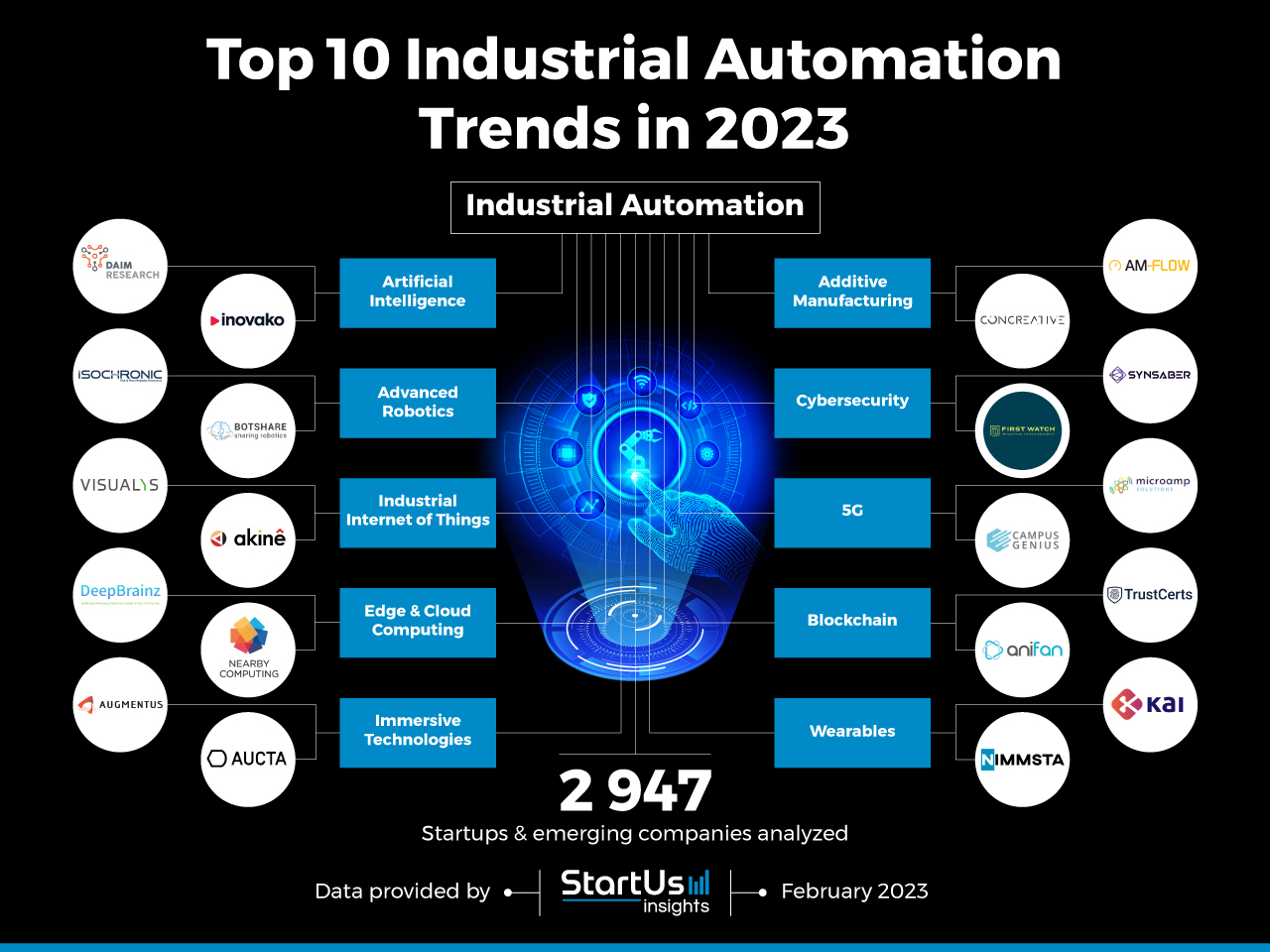
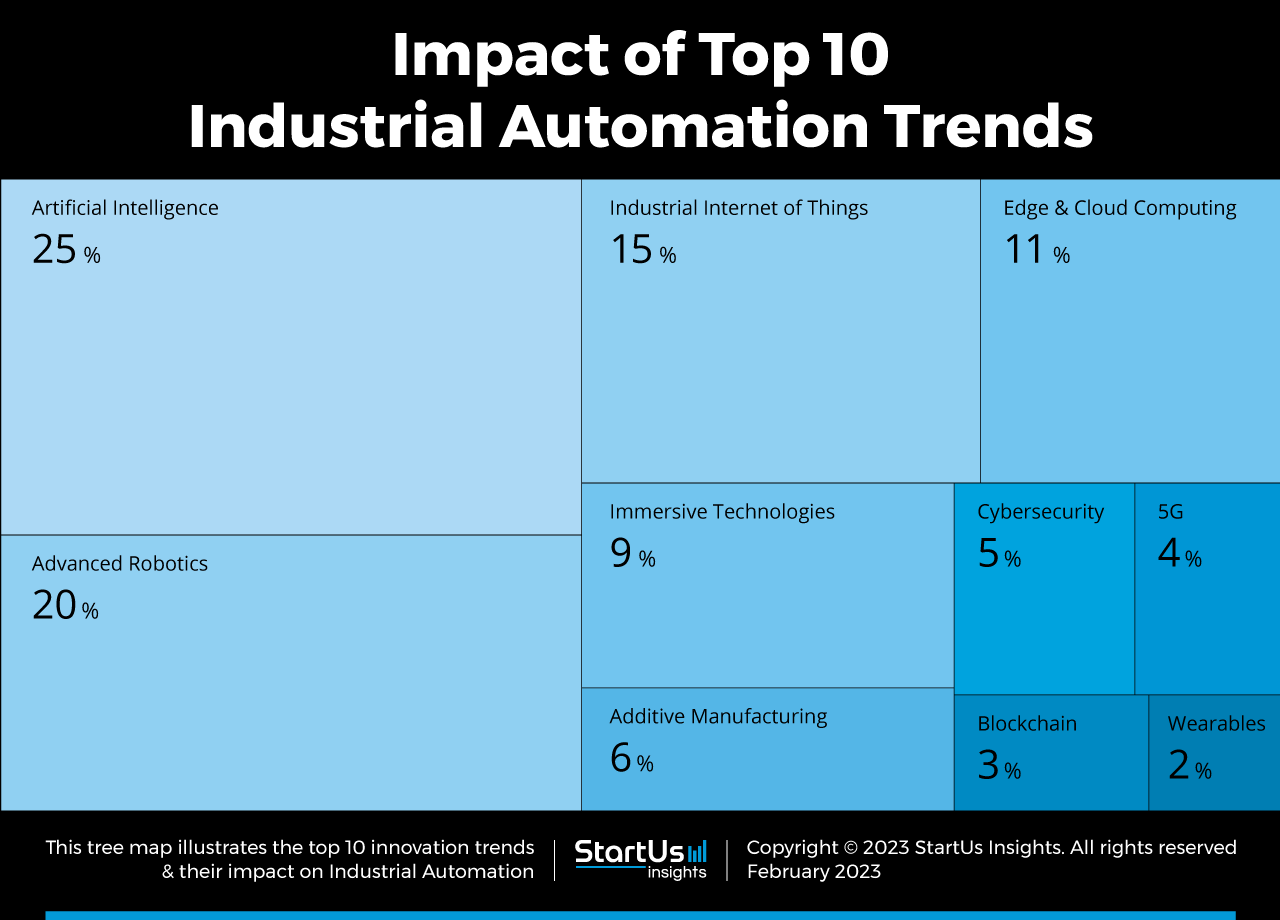



![10 Top Digital Twin Startups and Companies for Industry 4.0 [2025]](https://www.startus-insights.com/wp-content/uploads/2025/06/Digital-Twin-Startups-for-Industry-4.0-SharedImg-StartUs-Insights-noresize-420x236.webp)
